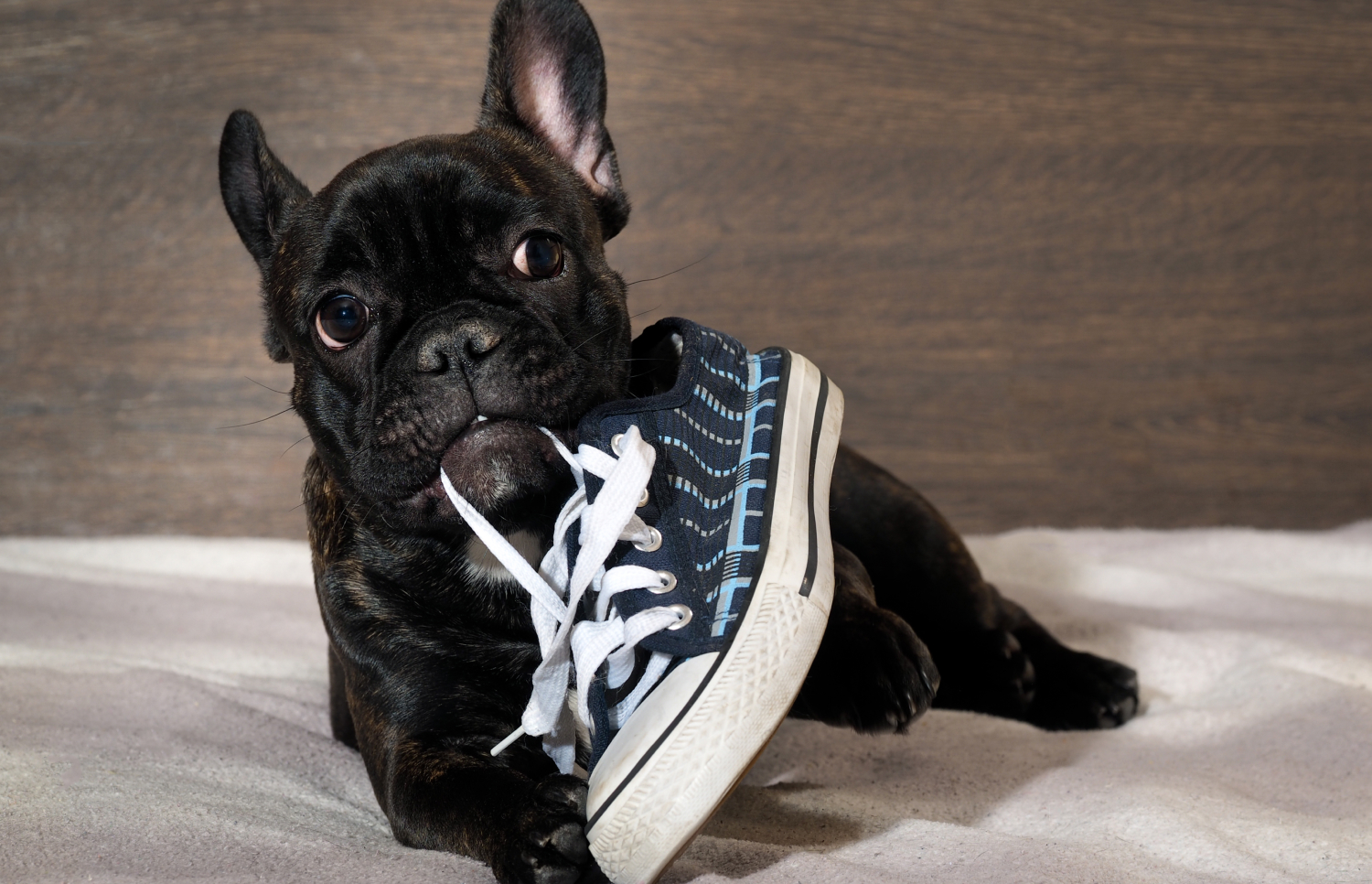One of the most common behavioral issues when talking about our dogs is their habit of destroying our things, specifically our favorite pairs of shoes. Some dogs, if left alone for any amount of time, will make it their mission to find a shoe or a slipper and have their way. Being greeted at the door with a destroyed shoe is not what most of us want, but it’s a reality many people live through.
In order to save your shoes, you have to get to the bottom of your dog’s behavior. While you can make it a rule that all shoes must be put away in the house, what happens when someone comes to visit and doesn’t realize the consequence of not hiding their shoes? The solution is to work with your dog to train away the behavior and ensure they get everything they need to be content.
To learn more about why dogs chew shoes and how to stop their destructive chewing habits, keep reading!
Why Do Dogs Chew?
It’s tricky to change your dog’s behavior without understanding why they are displaying it in the first place. Dogs chew shoes for a variety of reasons, so understanding your dog’s motivation for their action will help to come up with a plan to stop it. Generally, the main three reasons a dog chews up shoes are related to boredom, anxiety, and teething.
Boredom
Destructive chewing is often a sign of boredom. When your dog has nothing to occupy themselves with, they will search for something to solve their problems. In retrospect, shoes are often easy to get to and closely resemble chew toys that they are allowed to chew on. If your dog isn’t getting enough mental and physical stimulation throughout the day, they need to find a way to burn up their energy.
Chewing is not necessarily a bad behavior, considering we let our dogs chew on toys and bones, so your dog might resort to it knowing that it’s enjoyable. They likely aren’t seeking to ruin all of your shoes, but that’s one of the results of their boredom. We need to teach our dogs which items are appropriate to chew on and which items are not.
Anxiety
An anxious or nervous dog might resort to destructive chewing as a way to cope and self-regulate. The act of chewing can be self-soothing for your dog in times of anxiety. Some dogs with anxiety separation have more difficulty controlling their impulses, especially when left alone. As a preventative measure, if your dog has separation anxiety, make sure there is nothing they can get into lying around while you’re gone.
For dogs with excess energy that manifests as anxiety and nervousness, chewing can help them to calm down. Shoes, in particular, are loaded with their favorite human’s scent, so it makes your loafers a very easy target.
Teething
If your puppy chews on seemingly everything in their grasp, they might be in the teething stage. Puppies that are teething will feel more aches and pains as the process is happening, which will push them toward finding relief. Chewing on something, whether it’s your shoes, a rawhide-free chew, or the wooden leg of your dining room table, relieves that pain for them.
You can’t blame your new puppy for teething, but you can provide them with proper objects to teeth on.
How Do You Stop Destructive Chewing?
Once you have figured out why your dog is deciding to chew on your shoes, you can begin to stop the behavior. The most important thing is to maintain consistency while trying to train them out of their bad behavior and praise them when they choose an object other than your shoe.
Start Teaching Them Young
As soon as you get a new puppy, training begins. Puppies don’t yet have established habits, so they rely on their humans to teach them what habits are good and which are bad. This means prevention and properly disciplining whenever they’re caught in the act.
Remove any chance of your dog picking up the behavior, but if they ever decide to chew on a shoe, telling them “No” and “Drop it,” then replacing it with an acceptable option is key.
Swap the Shoe Out For Dog Toys
Whether your puppy or adult dog is ever chewing on a shoe, try to exchange the object immediately with a more appropriate item. This could be a high-value bully stick or a favorite squeaky toy.
When you change out the object, they begin to realize that the problem isn’t chewing: They just have the wrong thing. Giving them a new appropriate chew toy and praising them helps to reinforce that more welcome behavior.
Consider this scenario: You get home from the store, and your dog greets you with an acceptably chewable object. They know they won’t get the same satisfaction if they bring you an old shoe because you’ll simply take it from them. However, if they bring you one of their toys, they are met with praise and joy, reinforcing them to find that specific object every time.
Provide Enough Stimulation Each Day
Boredom is one of the leading causes of chewing up shoes. If your dog is not getting rid of the energy in their bodies throughout the day, it becomes pent up, often resulting in unwanted behaviors.
Your dog needs both mental and physical stimulation to be content. When dogs don’t get this kind of stimulation, they can turn to destructive chewing. Eventually, they might upgrade to more damaging objects, like doors, table legs, furniture, and more.
Interact with your dog as much as possible in a day so that they can release all of that pent-up energy. Going on twice (or more) daily walks, playing with them, and cuddling on the couch is good for your dog. This will help to meet their needs, and as a result, they will not destroy your property.
Offer Them Enrichment Activities
Beyond basic physical activity, enrichment activities are a great way to get energy out of your chewer. Similar to how walking and playing reduces boredom, enrichment activities, such as lick mats slathered with peanut butter, games of hide and seek, and training exercises, can help your dog feel satisfied — aka not feeling the need to start chewing things.
Perhaps one of the best ways to keep your dog’s mouth (and brain) occupied is with puzzle toys. You can make DIY puzzle toys like the tea towel snuffle m
at or purchase ready-made treat dispensing puzzles. Fill them with high-value dog treats or their regular dog food, and say goodbye to the barricade of baby gates in front of your shoe rack.
With enough physical and mental stimulation, dogs are more likely to settle down quickly and leave destructive behaviors behind. They aren’t acting out to try to get more attention because their needs are being met.
Talk with Pet Coaches at AskVet
Teaching a dog acceptable behaviors is hard enough. Trying to unlearn bad behavior can be even more difficult.
Luckily when you talk to the Certified Pet Coaches at AskVet, you can receive various dog training resources and ideas on how to improve this behavior. Questions may arise during your training process, and you can get quick and helpful responses 24/7 with our online chat.
When teaching your dog not to chew on your shoes or other off-limit objects in your house, don’t be shy to ask for some outside assistance! The important thing is that you get the help you need and are successful with training your dog. Sign-up today for a virtual session where our coaches learn about your dog, their behaviors, and what you wish to accomplish!
Sources:
Chewing Behaviour In Dogs – A Survey-Based Exploratory Study | ScienceDirect
Canine Separation Anxiety: Strategies For Treatment And Management | NCBI
Changes in the Dentition of Small Dogs up to 4 Months of Age | MDPI
Effects of Environmental Enrichment on Dog Behaviour: Pilot Study | NCBI
Are Rawhide Chews Dangerous for Dogs? | American Kennel Club
DIY Cognitive Dog Toys for When You Are Stuck at Home | American Kennel Club
How to Teach Your Dog to Sit, Drop, Come and Stay | Northcote Animal Hospital






